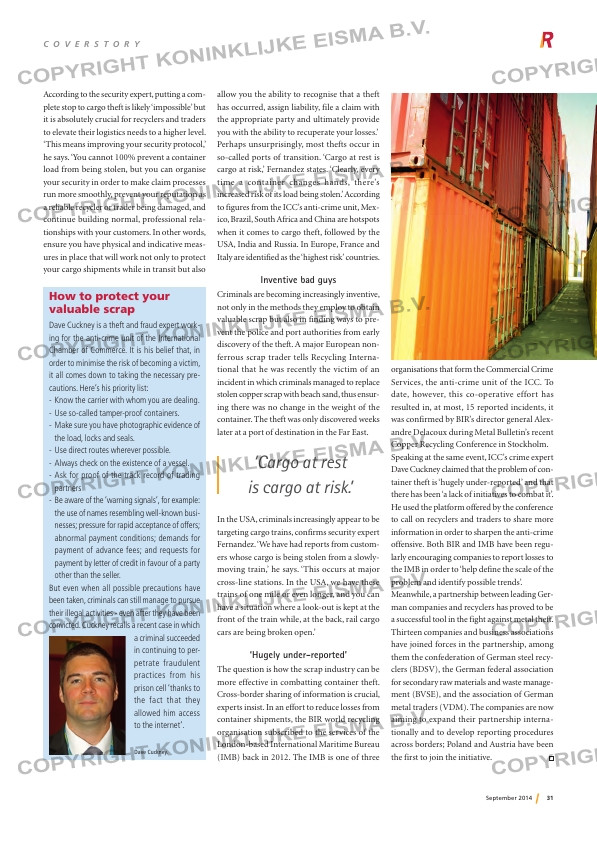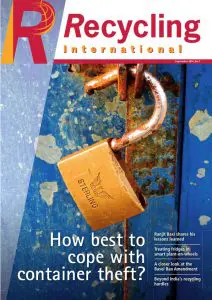Page 31 from: September 2014

31September 2014
C o v e r s t o r y
According to the security expert, putting a com-
plete stop to cargo theft is likely ‘impossible’ but
it is absolutely crucial for recyclers and traders
to elevate their logistics needs to a higher level.
‘This means improving your security protocol,’
he says. ‘You cannot 100% prevent a container
load from being stolen, but you can organise
your security in order to make claim processes
run more smoothly, prevent your reputation as
a reliable recycler or trader being damaged, and
continue building normal, professional rela-
tionships with your customers. In other words,
ensure you have physical and indicative meas-
ures in place that will work not only to protect
your cargo shipments while in transit but also
allow you the ability to recognise that a theft
has occurred, assign liability, file a claim with
the appropriate party and ultimately provide
you with the ability to recuperate your losses.’
Perhaps unsurprisingly, most thefts occur in
so-called ports of transition. ‘Cargo at rest is
cargo at risk,’ Fernandez states. ‘Clearly, every
time a container changes hands, there’s
increased risk of its load being stolen.’ According
to figures from the ICC’s anti-crime unit, Mex-
ico, Brazil, South Africa and China are hotspots
when it comes to cargo theft, followed by the
USA, India and Russia. In Europe, France and
Italy are identified as the ‘highest risk’ countries.
Inventive bad guys
Criminals are becoming increasingly inventive,
not only in the methods they employ to obtain
valuable scrap but also in finding ways to pre-
vent the police and port authorities from early
discovery of the theft. A major European non-
ferrous scrap trader tells Recycling Interna-
tional that he was recently the victim of an
incident in which criminals managed to replace
stolen copper scrap with beach sand, thus ensur-
ing there was no change in the weight of the
container. The theft was only discovered weeks
later at a port of destination in the Far East.
In the USA, criminals increasingly appear to be
targeting cargo trains, confirms security expert
Fernandez. ‘We have had reports from custom-
ers whose cargo is being stolen from a slowly-
moving train,’ he says. ‘This occurs at major
cross-line stations. In the USA, we have these
trains of one mile or even longer, and you can
have a situation where a look-out is kept at the
front of the train while, at the back, rail cargo
cars are being broken open.’
‘Hugely under-reported’
The question is how the scrap industry can be
more effective in combatting container theft.
Cross-border sharing of information is crucial,
experts insist. In an effort to reduce losses from
container shipments, the BIR world recycling
organisation subscribed to the services of the
London-based International Maritime Bureau
(IMB) back in 2012. The IMB is one of three
‘Cargo at rest
is cargo at risk.’
How to protect your
valuable scrap
Dave Cuckney is a theft and fraud expert work-
ing for the anti-crime unit of the International
Chamber of Commerce. It is his belief that, in
order to minimise the risk of becoming a victim,
it all comes down to taking the necessary pre-
cautions. Here’s his priority list:
– Know the carrier with whom you are dealing.
– Use so-called tamper-proof containers.
– Make sure you have photographic evidence of
the load, locks and seals.
– Use direct routes wherever possible.
– Always check on the existence of a vessel.
– Ask for proof of the track record of trading
partners
– Be aware of the ‘warning signals’, for example:
the use of names resembling well-known busi-
nesses; pressure for rapid acceptance of offers;
abnormal payment conditions; demands for
payment of advance fees; and requests for
payment by letter of credit in favour of a party
other than the seller.
But even when all possible precautions have
been taken, criminals can still manage to pursue
their illegal activities – even after they have been
convicted. Cuckney recalls a recent case in which
a criminal succeeded
in continuing to per-
petrate fraudulent
practices from his
prison cell ‘thanks to
the fact that they
allowed him access
to the internet’.
Dave Cuckney.
organisations that form the Commercial Crime
Services, the anti-crime unit of the ICC. To
date, however, this co-operative effort has
resulted in, at most, 15 reported incidents, it
was confirmed by BIR’s director general Alex-
andre Delacoux during Metal Bulletin’s recent
Copper Recycling Conference in Stockholm.
Speaking at the same event, ICC’s crime expert
Dave Cuckney claimed that the problem of con-
tainer theft is ‘hugely under-reported’ and that
there has been ‘a lack of initiatives to combat it’.
He used the platform offered by the conference
to call on recyclers and traders to share more
information in order to sharpen the anti-crime
offensive. Both BIR and IMB have been regu-
larly encouraging companies to report losses to
the IMB in order to ‘help define the scale of the
problem and identify possible trends’.
Meanwhile, a partnership between leading Ger-
man companies and recyclers has proved to be
a successful tool in the fight against metal theft.
Thirteen companies and business associations
have joined forces in the partnership, among
them the confederation of German steel recy-
clers (BDSV), the German federal association
for secondary raw materials and waste manage-
ment (BVSE), and the association of German
metal traders (VDM). The companies are now
aiming to expand their partnership interna-
tionally and to develop reporting procedures
across borders; Poland and Austria have been
the first to join the initiative.
RI-7 Container.indd 31 01-09-14 09:11



